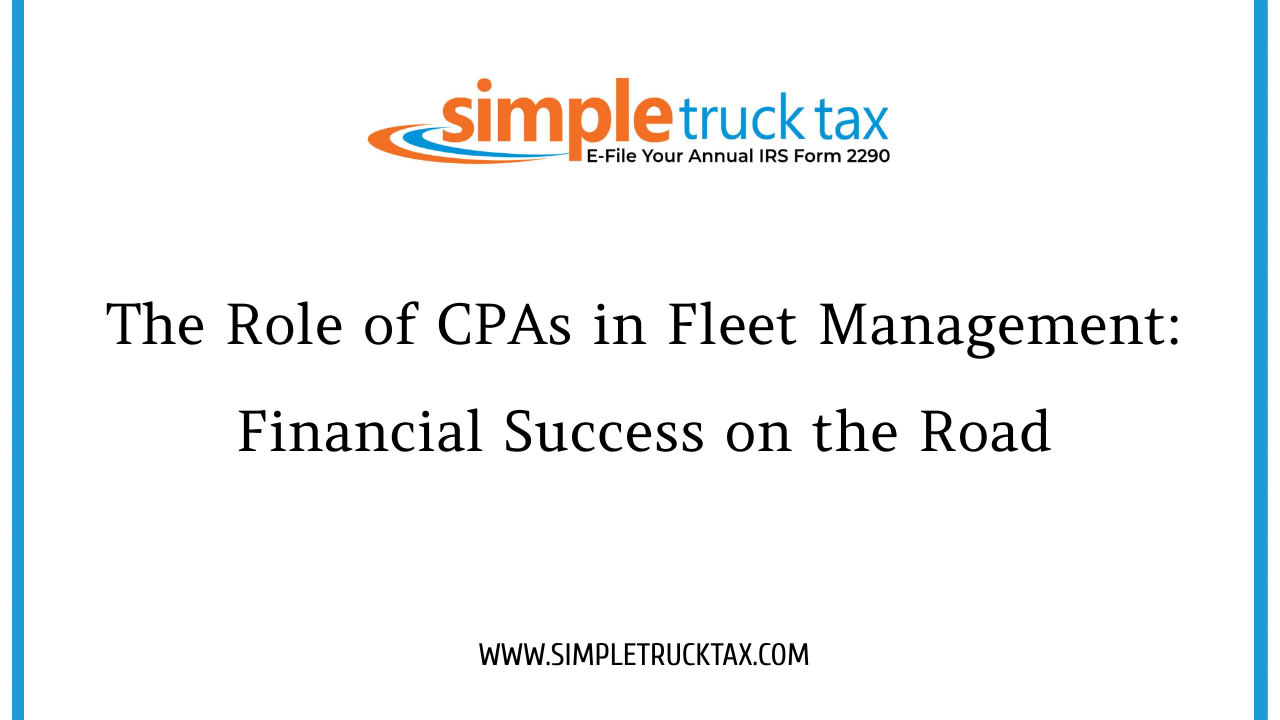11-06-2024
The Role of CPAs in Fleet Management: Financial Success on the Road
Accountants In Charge in Fleet Management: Ensuring the Financial Way Forward on the Roads
While dealing with the dynamics of fleet management identical stability and meticulous strategic planning are imperative for attaining long-term success. There may be numerous tasks related to scheduling, servicing and efficiency of operations assigned to fleet managers but the importance of public accountants’ performance, especially CPAs’, is attributive to sustainable performance of fleet operations. CPAs are particularly helpful for the fleet business’s development by managing their practice through providing business management strategies, tax strategies, prudent expenditure, and compliance with regulations. This article discusses how CPAs drive finances on the road and why they are key stakeholders in the trucking and fleet management industries.
Financing and Financial Planning and Strategy Development
The operation of a fleet can be considered capital intensive due to the need to budget for purchase of vehicles, maintenance of the vehicles, fueling of the vehicles, paying the employees on the payroll, customer insurance as well as spending on technology. CPA’s and their financial forecasting and planning competencies assist fleet managers in devising workable budgets geared towards the achievement of respective company objectives. These make it easier for fleet managers to back up and forecast for pockets of high expenditure periods like when there is a need for major overhaul of the vehicles or hiring of new ones.
CPAs also help in analyzing ways of cost-cutting in the negotiation of vendor agreements, planning of fuel purchases, and incorporating cost efficient and environmentally friendly procedures as part of the overall cost. Their participation is not limited to the preparation of the books, since they recommend strategies that enable fleet operators manage costs not exceeding revenues, which makes the business profitable in all seasons.
Tax Compliance and Tax Planning
Fleet operations are governed by a mix of taxation laws that include federal, state and at times local taxation. Managing these issues on behalf of fleet businesses is the job of CPAs who see to it that taxes are paid timely and all possible claims are made. Resource constraints have led fleet companies to find depreciation claims, fuel claims and maintenance claims but inside a C counted for depreciation, fuel consumption, C maintenance. Winn said that a CPA states that any reasonable business expense which was incurred is worth considering for tax reduction purposes and so it should be included in the tax return in order to allow cash to flow into the business.
Furthermore, accountants also keep abreast with the developments that take place in tax regulations and these can be critical for fleet companies. To illustrate, the future electric truck tax structure favors firms that have made the capital investment to produce environmentally sustainable fleets. These are the times when a CPA can assist fleet mangers about these opportunities that give an immediate tax benefit to firm investing within the changing regulations.
Assessment of Operational Aggravation and Management of Expenditures Optimization
The cost efficiency is of utmost importance in pure fleet operations where fuel, maintenance, and labor costs fluctuate to affect the bottom line. CPAs are facilitators in performing robust cost measurement functions, analyzing the fleet system’s operations for more economy without compromising on the quality and safety of the fleet. CPAs detect patterns and feelings around expenses by studying more complex financial data and highlight the cost variables and times with the most intense costs.
Using a data-pull approach, CPAs are in a position to recommend managers’ in a specific fleet on how to reduce operational costs. For example, if a fleet consistently spends too much on fuel, the CPA might suggest that the fleet manager consider bulk fuel contracts or buying route management software or purchasing new vehicles that are not fuel guzzlers. In a similar vein, they might argue that outsourcing specific repairs may cost less than employing a complete in-house maintenance unit allowing the company to invest its resources more effectively.
Risk Management and Financial Resilience
The running of the fleet is prone to a number of risks ranging from accidents, fuel price fluctuations, regulatory changes, and economic recession. CPAs help fleet businesses to become resilient through the development of risk management strategies which include insurance planning, cash reserves, and investments in varied sources of income. Through the provision of advice on adequate insurance and risk management measures, the CPAs assist fleet managers in limiting the economic effects of the unplanned events.
More typically, CPAs might help develop such plans so that fleet companies do not miss out on opportunities and have enough cushion for events when demand is low or costs increase drastically. For example, if a fleet’s cash inflow is constrained as a result of economic recessions, CPAs can put into place cash management processes to sustain the critical operational activities without undermining operational viability. Thus, CPAs extend the fleet’s forecasted profitability in the long run. They help a fleet deal with changes in the market and the uncertainties those changes bring.
Data Information Systems-D-based Decision Approach involving Financial KPIs
Recordkeeping and other financial units are important skills and metrics for fleet management. CPAs have the responsibility of determining and tracking the key performance indicators (KPIs) of verb fleet that includes financial, operational, and client relations. Cost per mile, total cost of operations, fleet turnover ratios, and profitability per unit vehicle are all KPIs frequently used in fleet management. When CPA conducts routine examination of the key performance indicators, fleet managers know their overall economic performance and when to make the necessary changes where it is possible.
In addition to the above, CPAs are also interested in the tactics relating the KPIs, particularly those that can directly contribute to profits. For instance, in the event that the cost per mile is considerably greater than the industry standards, CPAs might advocate for the change of fuel suppliers or endorse changing driving habits or perhaps changing vehicles to more efficient ones. These are in a way helping the fleet managers to portray a clear business strategy, improve the way things are run and in the end maximize profits.
Coordination of the Fleet Maintainance Process and Technological Facilities’ Development
More and more operational activities in the trucking and the fleet management industries are made possible with technology. Appropriate tools such as fleet management software, telematics and analytics provide useful information that, when well interpreted, can improve a fleet’s profitability. CPAs have an exceptional combination of skills in these technologies and financial operations and enable fleet managers to utilize the information for budgeting, managing expenditures and tax purposes.
Integrated with Information Technology and operation departments of the business, CPAs aid fleet managers in the deployment of systems that generate financial reports, facilitate the payment of wages, and assess expenditure on a daily basis. Of course, such integration cuts the expenditure of time and enhances the degree of precision in financial management information systems. Also, CPAs can recommend relevant software which minimizes management and compliance risks while securing financial information and supporting fleet managers’ decisions.
Maximizing profitability through financial consulting
Apart from their routine accounting services, corporate accountants assist fleet businesses in their long-term growth and adaptation to the industry. For instance, they help fleet managers in assessing possible new business opportunities such as launching logistics services or moving into new regions, by evaluating their feasibility and profitability. Advice on mergers, acquisition, or capital investment strategies also include guidance on what is the best way to obtain growth in the longer run.
When financing becomes necessary for fleet expansion purposes, the role of a CPA is critical. CPAs allow financing/regional fleet expansion to attract lenders/investors by generating different detailed documents such as financial statements and revenue projections. Their strategic management advisory services are very critical for the fleets targeting scaling of the operations while still remaining within the target leverage ratio, thus being able to enable the firm take reasonable business risks for sustainable success.
As you will learn here, one of the most prized possessions of any fleet manager is their CPA! It is also important to emphasize that CPAs provide more than tax services. They work closely with their client throughout the entire life cycle of the business. The strengths of CPAs in particular relate to understanding business strategies, risk factors, and growth opportunities. These forms CPAs around the ideology of providing business advisory services. And business advisory comes in many different flavors and forms, especially in the realm of fleet management where cost containment, tax strategies, and efficient technologies all come into play. If a CPA is not at your driver’s seat making a CPA available to you will provide you with an opportunity.
Note: For more information, visit IRS website


